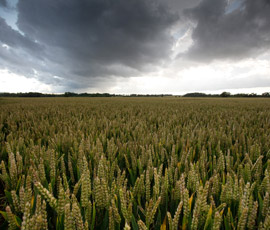Rain dampens Scottish wheat production by 30%

Scottish wheat production was down 30% to 673,000 tonnes in 2012 following one of the wettest summers in living memory.
The final estimate of cereal and oilseed rape harvest for 2012, published this week by the Scottish government’s chief statistician, Roger Halliday, shows that overall cereal production was down by 441,000 tonnes to 2.5m tonnes – 15% lower than 2011’s harvest.
Although total planted areas increased by 11,000 hectares or 2%, average yields fell by 17% to 5.5t/ha.
The drop in wheat production of 284,000 tonnes was against a backdrop of decreased areas and lower yields – areas planted fell by 15,000ha or 13%, while average yields decreased by 19% to 6.7t/ha.
Oilseed rape production was also significantly down by 29% to 106,000t – this was caused by a 25% drop in yields and a 5% drop in planted area.
“I have made clear that the government will do all it can to support farmers at this difficult time. That’s why we have taken a range of measures designed to help – including writing to the banks to urge them to show leniency to farmers who have yet to receive their SFP and working to help farmers deal with slurry spreading issues.”
Scottish rural affairs secretary Richard Lochhead
Barley production fell by 8% to 1.7m tonnes, mainly due to a decrease in spring barley yields – down 14% despite a 10% increase in planted areas – resulting in 86,000t less production.
Winter barley production decreased by 57,000t, due to a 12% drop in yield and 6% decrease in area planted.
Oats production decreased by 14,000t, or 11%, to 108,000t – this was down to a 9% decrease in area and an 18% drop in yields.
“While market prices for cereals have shown an increase on last year it is likely that overall returns will be less for many farmers due to additional production costs, including drying costs,” said Scottish rural affairs secretary Richard Lochhead.
“I have made clear that the government will do all it can to support farmers at this difficult time. That’s why we have taken a range of measures designed to help – including writing to the banks to urge them to show leniency to farmers who have yet to receive their SFP and working to help farmers deal with slurry spreading issues.”
Forfar farmer combines wheat in December
UK could remain net importer of wheat
